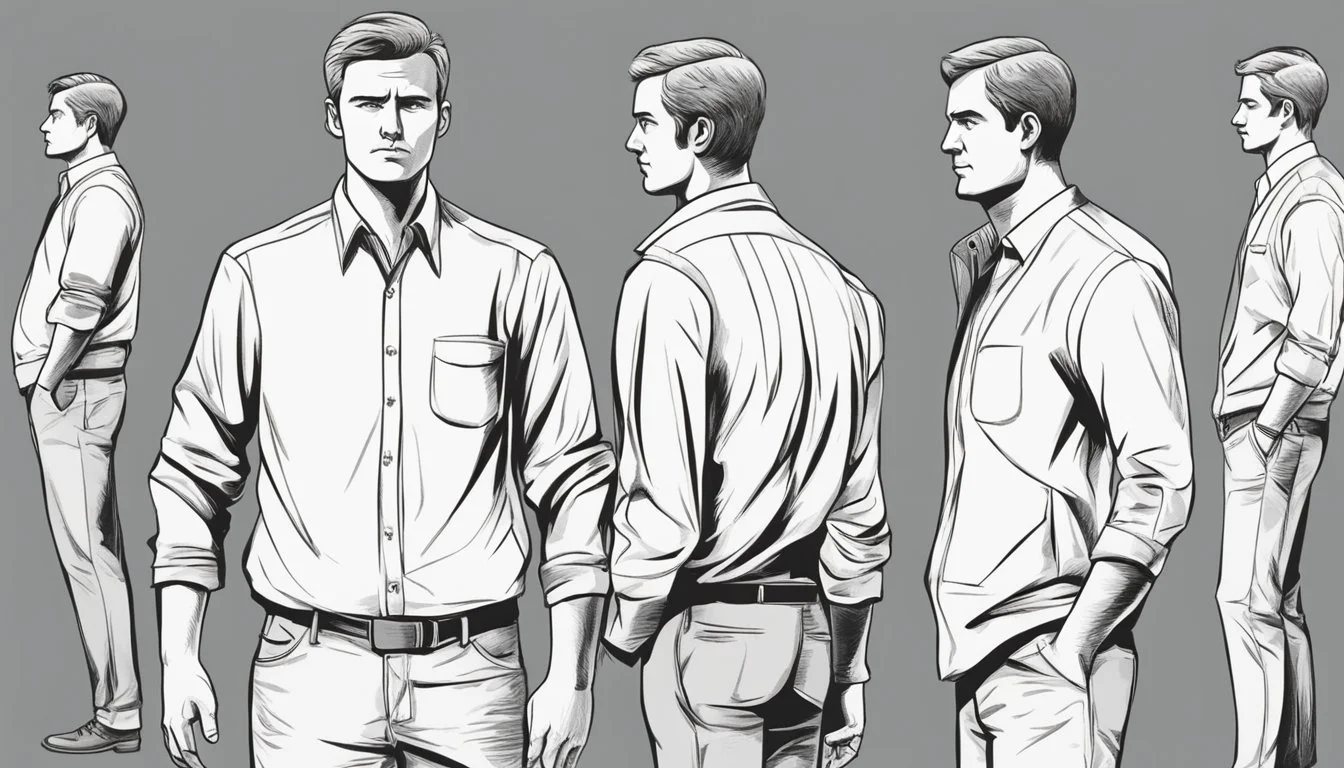13 Common Non-Apology Apologies Used by Narcissists
Spotting Insincere Remorse
Narcissists are often skilled at manipulating their words to avoid taking responsibility for their actions. Their apologies may sound sincere on the surface, but closer examination reveals a different story. These non-apology apologies often leave the recipient feeling confused and invalidated.
Recognizing these common tactics can be crucial in maintaining healthy boundaries and protecting one's emotional well-being. Understanding how narcissists use these strategies can empower individuals to identify and address manipulative behaviors more effectively. This article will explore some of the most frequently used non-apology apologies by narcissists, helping readers to spot them and respond appropriately.
1) "I'm sorry you feel that way."
The phrase "I'm sorry you feel that way" often masquerades as an apology. It shifts the focus from the speaker's actions to the recipient's feelings. This deflects responsibility and lacks genuine remorse.
Narcissists use this tactic to avoid admitting wrongdoing. It invalidates the other person's emotions, making them feel their reaction is the issue.
Instead of addressing their behavior, the narcissist implies the other person's feelings are the problem. This creates a sense of frustration and misunderstanding. The statement feels dismissive rather than conciliatory.
By using "I'm sorry you feel that way," the speaker avoids accountability. Real apologies require acknowledging harm caused and expressing true empathy. This phrase fails to meet those criteria, revealing it as a hollow gesture.
2) "I guess I apologize."
The phrase "I guess I apologize" is often used by narcissists to deflect responsibility. It gives the appearance of an apology without the sincerity. This phrase can make the recipient feel like the issue is being dismissed.
Narcissists use this phrase to maintain control. By adding "I guess," they imply that their apology is reluctant or forced. It minimizes the acknowledgement of their wrongdoing.
This type of apology lacks genuine remorse. The narcissist sidesteps admitting fault directly. This can leave the other person feeling invalidated and confused.
Using ambiguous language like "I guess" also creates ambiguity. It allows the narcissist to later claim they never truly apologized, if confronted again. This tactic protects their ego.
Victims may recognize this phrase during discussions or conflicts. Recognizing patterns can help in identifying emotional manipulation. Understanding these phrases is crucial in navigating interactions with narcissists.
The phrase appears in discussions about narcissistic behavior on platforms like Reddit. People often share similar experiences, noting the insincerity behind such apologies. These insights emphasize the need to critically evaluate apologies.
3) "I’m sorry if I did something to offend you."
This phrase is a common non-apology used by narcissists. It shifts the responsibility away from the person apologizing and places it on the offended party. The use of "if" suggests that the offense might not have happened at all, questioning the other person's feelings.
By saying "something to offend you," the apology lacks specificity. It avoids addressing the actual actions or words that caused harm. This vagueness diminishes the sincerity of the apology and doesn't acknowledge the pain inflicted.
Narcissists often use this apology to maintain control in a situation. They avoid showing vulnerability or admitting fault, which could undermine their self-image. Instead, they provide only a superficial acknowledgment of the issue.
For the offended person, this type of apology can feel empty and dismissive. It often leaves them feeling unheard and invalidated. The focus remains on the feelings of the person apologizing, not the person who was hurt.
To provide a real apology, it's important to specifically acknowledge the wrongdoing and directly address the harm caused. Removing the conditional "if" and stating clearly what was done wrong can make the apology genuine and more meaningful. For further exploration, see this article on difficulties in apologies.
4) "I'm sorry you took it that way."
"I'm sorry you took it that way" is a common non-apology. It shifts the blame to the recipient, suggesting the issue lies with their interpretation rather than the speaker's actions.
This phrase indicates a lack of genuine remorse. It fails to acknowledge any wrongdoing or harm caused.
Such responses can exacerbate conflicts. They invalidate the recipient's feelings, leaving them unheard.
Narcissists often use this tactic to avoid personal responsibility. It maintains their sense of superiority.
Using this phrase undermines trust. It signals to the recipient that their feelings and perspectives are not valued.
Offering a sincere apology involves acknowledging the harm and taking full responsibility. This phrase falls short of those standards.
A more effective approach would be, “I’m sorry for my actions.” This demonstrates accountability and recognizes the impact of one's behavior.
In relationships, clear and honest communication is crucial. Apologies that deflect responsibility hinder relational growth and understanding.
To foster healthier interactions, it's important to avoid phrases like "I'm sorry you took it that way" and strive for genuine apologies.
For more insights on why this phrase is problematic, visit Caveman Circus.
5) "I apologize, but..."
A classic tactic used by narcissists is the "I apologize, but..." statement. This type of apology superficially suggests contrition but fails to take real accountability.
Adding a "but" after an apology often negates the initial expression of regret. The phrase typically introduces an excuse or justification for the offending behavior.
For example, saying "I apologize, but you made me angry" shifts blame to the other person. This response avoids accepting full responsibility.
Such apologies can feel insincere to the recipient. They may perceive that the person apologizing is more interested in defending themselves than in genuinely making amends.
In relationships, these statements can hinder genuine conflict resolution. The underlying issues remain unaddressed, leading to further resentment and misunderstandings.
According to MentalHelp.net, starting with "I'm sorry" or "I apologize" needs to be followed by taking full responsibility without excuses to be effective.
6) "I'm sorry you misunderstood."
When a narcissist says, "I'm sorry you misunderstood," they shift the blame onto the other person. This type of apology suggests that the problem lies with the listener's comprehension rather than the speaker's statements.
This tactic invalidates the feelings of the person who was hurt. It implies that their reaction is unwarranted, minimizing their experience and feelings.
Narcissists often use this phrase to avoid taking responsibility for their actions. By framing the issue as a misunderstanding, they evade direct accountability.
Such a statement can create doubt in the listener's mind. They may start questioning their own perceptions and feelings.
Using “I'm sorry you misunderstood” also allows the narcissist to maintain a facade of politeness. It appears as though they are offering an apology, but without genuinely acknowledging any wrongdoing.
This phrase is a common false apology that manipulates the dynamic to favor the narcissist. They retain control of the narrative, while the hurt party feels invalidated and confused.
7) "If it makes you feel better, I'm sorry."
Narcissists often use the phrase, "If it makes you feel better, I'm sorry," as a way to deflect responsibility. This type of apology places the focus on the other person's emotions rather than the narcissist's actions.
Such statements are typically superficial and lack genuine remorse. They aim to placate the other party without admitting any wrongdoing. The narcissist remains in control, subtly implying that the apology is given for the sake of the other person.
Using this phrase can also invalidate the feelings of the person seeking an apology. It suggests their need for an apology is unwarranted or burdensome, further diminishing their concerns. By framing it this way, the narcissist can manipulate the situation to avoid genuine accountability.
This type of apology is more about ending the conflict quickly than addressing the underlying issue. The focus remains on controlling the narrative rather than making amends.
8) "I regret that you're upset."
Narcissists often use the phrase "I regret that you're upset" to shift focus away from their actions.
This expression serves to feign empathy while avoiding taking responsibility.
By saying this, they make it seem like the issue lies with your reaction and not with their behavior.
Their wording implies that your feelings are the problem, rather than their actions.
It’s a subtle way to dismiss your emotions.
Instead of a genuine apology, it becomes a manipulation tactic to minimize their guilt.
In conversations, this phrase can make you feel as though you're overreacting, which can further confuse and frustrate you.
Such non-apologies are designed to protect their ego and avoid true accountability.
Recognizing this pattern can help in setting boundaries with narcissists.
9) "I’m sorry you think I’m wrong."
This type of apology often comes off as dismissive. The person apologizing does not acknowledge any fault. Instead, they frame the issue as a matter of perception.
Using the phrase "I’m sorry you think I’m wrong" shifts the blame. The focus is not on their actions but on your reaction.
By avoiding responsibility, it can invalidate the feelings of the other person. The apology seems insincere and fails to address the real issue.
This tactic can be frustrating in personal and professional interactions. It may lead to unresolved conflicts and lingering resentment.
Users on platforms like Reddit often discuss how infuriating these non-apologies can be. They feel like a refusal to admit any wrongdoing.
Overall, this type of apology is more about self-preservation than reconciliation. It is a common tool for those who struggle with accountability.
10) "Sorry, but I don’t see the problem."
This non-apology shifts blame onto the victim, suggesting that their feelings or reactions are unfounded.
It deflects responsibility, implying that the issue lies in the victim’s perception rather than the narcissist’s behavior. The phrase invalidates the victim's experience by questioning the legitimacy of their concern.
Narcissists use this tactic to maintain control and avoid taking accountability. It allows them to continue their behavior without facing consequences.
The phrase creates a power imbalance, casting doubt on the victim’s perspective. It can make the victim question their own feelings and perceptions.
By using "Sorry, but I don’t see the problem," narcissists dismiss others' emotions as irrelevant or exaggerated. This tactic is a way to shut down further discussion or criticism.
11) "I’m sorry if my words hurt you."
The phrase "I’m sorry if my words hurt you" is often used to shift the focus away from the speaker's responsibility. It suggests a lack of awareness or acknowledgment of the wrongdoing.
Narcissists use this phrase to subtly place the blame on the recipient. It implies that the recipient may be overly sensitive or misinterpreting the intent.
Instead of offering a genuine apology, this statement minimizes the impact of the harmful words. The use of "if" creates ambiguity, leaving room for the possibility that no harm was actually done.
This type of non-apology fails to address the root issue or provide closure. It can leave the recipient feeling invalidated and unheard. It’s a tactic to sidestep taking responsibility while appearing to be considerate.
12) "I apologize for any inconvenience."
The phrase "I apologize for any inconvenience" is often used by narcissists as a non-apology apology. This statement superficially addresses an issue without taking responsibility for specific actions.
By using this phrase, the individual avoids admitting any fault. The emphasis is on the inconvenience rather than the harmful behavior or action that caused it.
This apology deflects blame and minimizes the significance of the wrongdoing. It shifts the focus away from the person at fault to the impact on the recipient, making it seem less personal and more like a generic inconvenience.
For more insights into this form of apology, read Dr. Craig Malkin's blog. In some contexts, it can even come across as insincere or dismissive, particularly if the affected party feels their concerns are not adequately addressed.
In corporate or customer service settings, this phrase is often used to maintain a professional tone while avoiding direct responsibility.
It can leave the recipient feeling unheard and unimportant. This method of apology lacks the acknowledgment needed for genuine resolution and healing between parties.
13) "If you were offended, I apologize."
The phrase "If you were offended, I apologize" shifts the responsibility for the feelings onto the recipient. It implies that the problem lies with the person who felt hurt, rather than with the action or words that caused the offense.
This type of apology lacks genuine remorse and fails to acknowledge wrongdoing. By using conditional language, the speaker avoids taking full accountability for their actions.
Narcissists often employ this tactic to maintain a facade of being apologetic while subtly blaming the other person. This approach serves to downplay their behavior and dismiss the feelings of those who are offended.
Recognizing Non-Apology Apologies
Identifying non-apology apologies often centers on the specific phrases used and understanding the negative impact these have on relationships. These so-called apologies can mask genuine remorse and hinder emotional healing.
Common Phrases and Their Meanings
Narcissists frequently use phrases that appear as apologies but deflect blame or diminish the recipient's feelings. Common examples include:
"I'm sorry if you misunderstood my actions." This phrase shifts responsibility to the other person's perception rather than acknowledging fault.
"I apologize, but you have to admit, you overreacted." Here, the apology is coupled with an accusation, undermining its sincerity.
"I’m sorry, it wasn’t entirely my fault." This partial acceptance reduces accountability and often introduces external factors to share the blame.
"I apologize if you feel that way." Such statements invalidate the other person's emotions by implying they are overly sensitive.
These phrases serve more to protect the apologizer's ego than to address the harm caused. Recognizing these patterns is crucial for distinguishing genuine remorse from mere lip service.
Impact on Relationships
Non-apology apologies can create significant strain on relationships. They often leave the offended party feeling unseen and unheard. When an apology fails to acknowledge the hurt or responsibility, it can lead to unresolved conflicts and erode trust over time.
Repeated exposure to these types of apologies can cause recipients to doubt their own feelings and perceptions. This dynamic is particularly damaging in close relationships, where mutual understanding and respect are paramount.
Furthermore, non-apologies can perpetuate a cycle of hurt and resentment. Without proper acknowledgment and redress, past issues can fester, leading to recurring arguments and emotional distance. Recognizing these insincere apologies is the first step in breaking this cycle and fostering healthier communication.
Psychological Mechanisms Behind Non-Apology Apologies
Non-apology apologies used by narcissists employ psychological mechanisms like defense mechanisms and manipulative tactics to avoid responsibility and maintain control. These strategies not only protect the narcissist’s self-image but also confuse and destabilize their victims.
Defense Mechanisms
Narcissists often use defense mechanisms to shield themselves from feelings of guilt or shame. One common defense mechanism is projection, where the narcissist attributes their own undesirable qualities or behaviors to others. For instance, they might accuse someone else of being selfish to conceal their own selfish actions.
Another defense mechanism is rationalization. Here, a narcissist offers seemingly logical reasons for their behavior, effectively excusing it. By saying, “I was just trying to help,” they deflect criticism and imply their intentions were pure, even if the outcome was harmful.
Denial is also prevalent. A narcissist might outright refuse to admit wrongdoing. Statements like, “I didn’t do anything wrong,” serve to negate any accusations and protect their self-esteem. This defense mechanism helps them avoid facing the psychological discomfort of accepting responsibility for their actions.
Manipulative Tactics
Manipulative tactics are employed by narcissists to control and influence others. One such tactic is gaslighting, which involves making the victim doubt their own perceptions and reality. This can be done through phrases like, “You’re overreacting,” which minimizes the victim's feelings and experiences.
Blame-shifting is another tactic. Instead of acknowledging their fault, a narcissist redirects the blame onto someone else. For example, saying, “You made me do it,” shifts responsibility and guilt away from the narcissist.
Feigning victimhood is a powerful manipulative tactic. By presenting themselves as the true victim, narcissists garner sympathy and avoid blame. This can be seen in statements like, “I don't know why you're attacking me,” which diverts attention from their wrongdoing and paints the accuser as the aggressor.
These psychological mechanisms serve to maintain the narcissist's dominance while keeping their true nature hidden from their victims.













